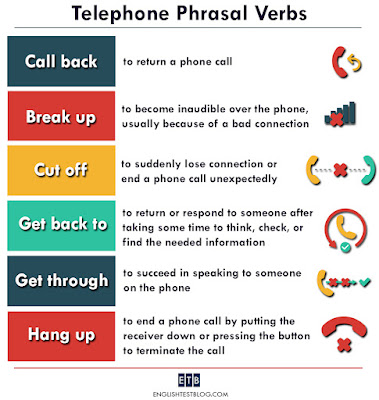Phrasal verbs are an essential part of English. Learning and understanding them will allow you to express yourself more effectively. In this lesson, we're going to explore a bunch of phrasal verbs related to phone conversations.
If you want to take your English to the next level, definitely learn these phrasal verbs. They are super useful for both talking on the phone and explaining what happened during phone calls.
Stick around till the end, and you'll find a video all about phone phrasal verbs in British English. It's a great way to reinforce your learning and improve your pronunciation. We highly recommend checking it out!
Call backThe phrasal verb "call back" means to return a phone call. When someone is unable to answer a phone call at that moment, they might say "I'll call you back later".
For example:
- I'm driving at the moment, so I can't talk. I'll call you back when I reach my destination.
When a person who is talking on a mobile phone breaks up, the voice on the line stops and starts unexpectedly and it is hard to hear and understand each other. This can happen due to a weak signal, bad network connection, or technical issues with the phone or service.
For example:
- It's hard to understand you; you're breaking up on my end.
“Cut off” means to suddenly lose connection or end a phone call unexpectedly.
For example:
- During our phone call, the signal was weak, and we were cut off in the middle of our conversation.
This phrasal verb means to return or respond to someone after taking some time to think, check, or find the needed information.
For example:
- I'm currently on another call, but please leave your name and number, and I'll get back to you shortly.
The phrasal verb "get through" means to succeed in speaking to someone on the phone. It is used when you try to call someone, and after attempting for some time, the call is finally connected, and you can speak to the person you intended to reach.
For example:
- I tried calling my friend several times, but the network was busy. Finally, on my fifth attempt, I got through to her, and we had a nice chat.
The phrasal verb "hang up" means to end a phone call by putting the receiver down or pressing the button to terminate the call. When you finish talking on the phone, you "hang up" to disconnect the call.
For example:
- After talking to my mom for a while, I said goodbye and hung up the phone.
For example:
- I didn't want to hear his excuses, so I decided to hang up on him before he could start talking.
Hold on
The phrasal verb "hold on" means to wait and stay connected during a phone call. It is used when someone needs to pause the conversation temporarily or put the caller on hold without disconnecting the call completely. While on hold, the person may hear background music or a recorded message until someone is available to continue the conversation.
For example:
- Could you please hold on for a moment? I'll transfer you to the appropriate department.
The phrasal verb "phone in" means to make a phone call to the place where you work in order to inform your employer about something important. For instance, if you cannot go to work because you are sick or have an emergency, you might "phone in" to let your employer know that you won't be able to come to work on that day.
For example:
- Sarah wasn't feeling well, so she decided to phone in sick to her boss and take the day off.
This phrasal verb means to answer the phone.
For example:
- I received a missed call from an unknown number, but when I called back, nobody picked up.
The phrasal verb "put through" means to transfer or connect a phone call from one person to another. For example, if you call a company and ask to speak with a specific person, the receptionist or operator will "put you through" to that person by connecting your call to their phone extension.
For example:
- The receptionist said she would put me through to the manager so I could discuss my concerns directly.
"Speak up" means to talk louder or increase the volume of your voice so that you can be heard more clearly
For example:
- I'm on a noisy bus right now. Could you speak up so I can hear you better?


Comments
Post a Comment